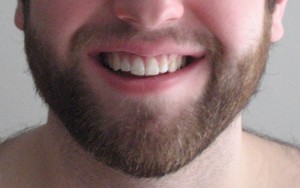Wondering about microbes found in beards? Recent TV stories made it sound as if they are incredibly filthy and harbor bacteria. Well, the news stories were not good because they asked the wrong question (should have asked: do bearded men have more bacteria on their faces than clean shaven ones? - and a 2014 study found that they don't) and they neglected to say that we are all covered with bacteria, all sorts of bacteria, and this is normal. And the "enteric bacteria" they found? Well, they're all over - the human gut, normal human skin, cheese,etc. Microbiologist David Coil from Slate:
Your Beard Is Covered in Bacteria
The irrational germophobia story of the week is that beards harbor “dangerous germs.” This story hits almost all the sweet spots of the genre: It has no actual data, no controls, nonsensical interpretation of results (such as they are), and a punch line that can be summed up in 140 characters or fewer.
In this “study,” the news station swabbed a few beards, sent them off to a company for analysis, and got back a report that the beards contained “germs,” specifically enteric bacteria, which are part of the human gut microbiome and therefore also found in feces. Voila: “Your beard is as dirty as a toilet,” and “Beards contain poop” sweep the Internet. Let’s take apart each piece of this misleading viral phenomenon.
The original story doesn’t say how many beards were tested … just a “handful.” Let’s be generous and call it 10 beards. Not exactly a great sample size, but not the end of the world. The real problem here is the lack of swabs from clean-shaven men. People are covered, absolutely covered in bacteria. Yes, that means you too … 15 showers a week notwithstanding. Everything is covered in bacteria, most of which are harmless or beneficial. Any story that starts with “we found germs on X” is already pointless unless you’re talking about Mars, the moon, or something that’s supposed to have been sterilized (like surgical equipment). So of course they found bacteria on beards. And I can promise you that if they swabbed any other part of those dudes, they’d also find bacteria. Amazing!
What we’d want to know is whether men with beards harbored more bacteria than men with clean-shaven faces. Which of course they didn’t look at.Fortunately, this question has been addressed in the scientific literature. A recent article titled “Bacterial ecology of hospital workers’ facial hair: a cross-sectional study” concluded that health care workers with and without beards harbored similar numbers of bacteria.
OK, so what about the kinds of bacteria? If we’re concerned about health, then the type of bacteria is far more important that the numbers....The microbiologist in this story says that they found “enteric” bacteria, which were the “kind of things that you’d find in feces.” Well, OK. Many members of the Enterobacteriaceae family are found in the gut (and therefore feces). Some are even pathogens. Most are not; some are beneficial, even essential for human health. Assuming that finding enteric bacteria equates to finding feces is like saying that finding cat hair on your couch means you’re at risk of being eaten by a lion. Members of the Enterobacteriaceae family can also be found on normal human skin, cheese, plants, seeds, water, and soil. I’d be willing to bet that you can find enteric bacteria pretty much everywhere if you look hard enough. And do those present a health risk? Probably not, as even the microbiologist in the original story admits.

